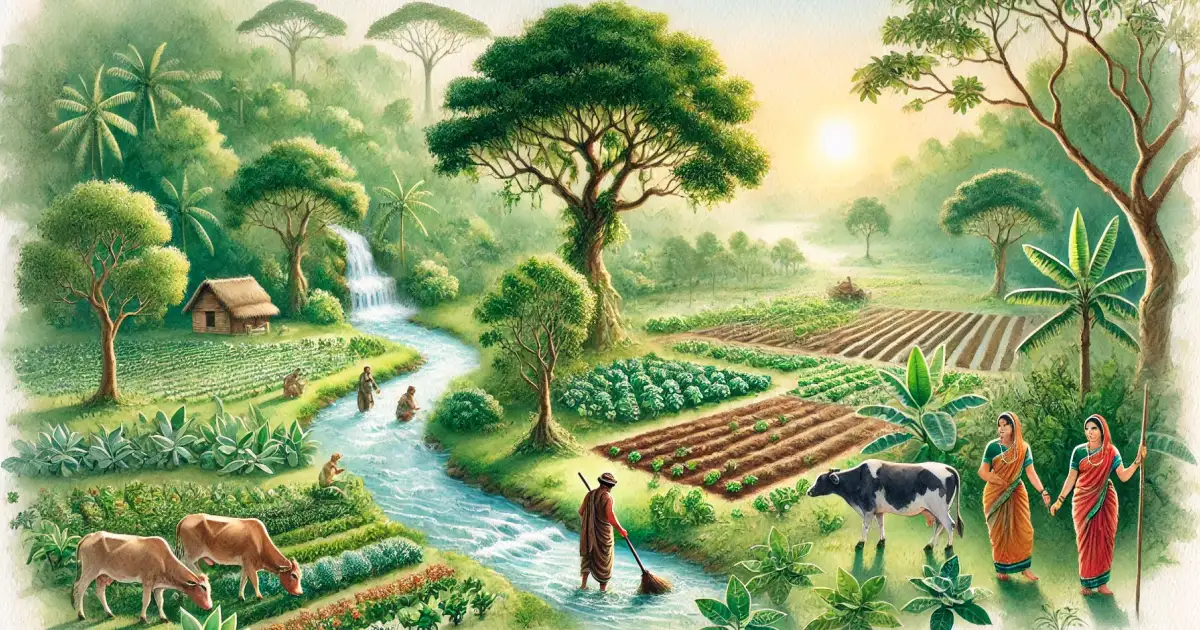Introduction: Integrating Nature and Knowledge
Ancient India pioneered a holistic approach to health, recognizing the deep interconnections between humans, animals, and the environment. While Āyurveda focused on human well-being, complementary sciences such as Vṛkṣāyurveda (plant health) and Paśu-āyurveda (animal health) contributed to a broader One Health framework.
In the face of modern agricultural challenges—soil degradation, pesticide toxicity, and declining livestock health — Vṛkṣāyurveda offers a sustainable, time-tested alternative. It emphasizes restoring ecological balance using natural methods, many of which are now scientifically validated.
Reviving Soil Health Through Vṛkṣāyurveda
Soil health forms the foundation of agriculture. Vṛkṣāyurveda advocates biological fertilizers over synthetic chemicals, using techniques such as:
- Kunapajala – A fermented liquid manure that enhances soil fertility and plant immunity.
- Pañcagavya – A blend of cow dung, urine, milk, curd, and ghee, boosting microbial activity and plant resilience.
Modern research confirms that these formulations lead to higher crop yields, increased pest resistance, and improved soil microbiota, reinforcing the wisdom of ancient agricultural practices.
Gauśālā-Based Vṛkṣāyurvaidika Farming in Al-Ain
During my consultancy for a gauśālā in Al-Ain (150 km from Dubai), we prioritized organic feed for cattle before implementing the One Health concept. By ensuring chemical-free fodder, we established a self-sustaining agricultural cycle:
- Organic cattle feed led to pesticide-free manure.
- Dung-based compost revitalized degraded soil.
- Kunapajala and similar solutions enhanced plant immunity.
This closed-loop farming system demonstrated the interconnectedness of plant, animal, and human health, exemplifying the One Health approach in practice.
Agriculture in deserts is often seen as impractical, yet traditional farming techniques have successfully sustained crops in arid environments for centuries. The key difference lies in the approach:
- Conventional chemical-based farming relies on synthetic fertilizers and irrigation but neglects the biological foundation of soil fertility.
- Vṛkṣāyurvaidika farming prioritizes soil life, organic matter, and ecosystem balance, ensuring long-term sustainability.
Beyond Soil: A Holistic Agricultural System
Āyurvaidika agriculture is not merely about crop production; it is about working in harmony with nature. Unlike modern precision farming, which treats land as an input-output system, Āyurveda sees land as a living entity requiring nurturing. Key principles include:
- Promoting underground microbial activity instead of relying on synthetic fertilizers.
- Implementing regenerative water retention strategies rather than excessive irrigation.
- Encouraging biodiversity-rich agroforestry systems instead of monocultures.
Sustainable Farming in Extreme Climates
The failures of extractive, chemical-based precision farming in harsh environments highlight the necessity of a biology-first approach. Ayurvedic farming has demonstrated that even desert landscapes can be transformed into thriving agricultural ecosystems when nature’s intelligence is respected.
Preserving the Integrity of Āyurvaidika Herbs
Āyurveda recognizes that medicinal plants derive their potency from their natural environment. However, modern farming practices compromise this principle:
- Chemical fertilizers and pesticides degrade soil quality and reduce herbal efficacy.
- Geographic displacement of medicinal plants weakens their bioactive compounds.
- Environmental pollution contaminates herbs, diminishing their therapeutic value.
For instance, Aśvagandhā (Withania somnifera), revered for its adaptogenic properties, thrives in India's arid regions. Attempts to cultivate it elsewhere often result in reduced potency due to differences in soil composition, climate, and microbial interactions. Āyurveda values the ecosystem in which herbs grow, not just their chemical composition.
The Shortcomings of Precision Chemical Farming
Modern precision agriculture in deserts relies heavily on synthetic inputs, but this approach fails to build a sustainable system. Key issues include:
- Soil degradation and loss of microbial life.
- Increased salinity and water inefficiency.
- Dependence on external chemical inputs.
Beyond Molecular Science: A Systemic Approach to Āyurveda
Modern medicine often attempts to validate Āyurveda by isolating specific compounds, such as curcumin from turmeric. While useful for pharmacology, this reductionist approach disregards Āyurveda’s holistic methodology, which considers:
- The plant’s complete chemistry rather than isolated molecules.
- The interactions between different herbs in formulations.
- The body’s unique bio-energies (Vāta, Pitta, Kapha) in response to treatments.
The Industrialization of Āyurvaidika Herbs: A Growing Concern
Many Āyurvaidika herbs today are cultivated using conventional farming methods, undermining their medicinal properties:
- Aśvagandha grown with chemical fertilizers may appear identical but lacks its full spectrum of bioactive compounds.
- Turmeric treated with synthetic pesticides retains curcumin but loses its holistic therapeutic profile.
- Brāhmī grown hydroponically may survive but lacks essential earth-derived minerals.
Āyurveda is not merely a collection of plant-based remedies; it is a holistic science rooted in ecological intelligence. If Āyurveda is to retain its authenticity, Vṛkṣāyurveda must be revived to ensure ethical and sustainable cultivation practices.
Conclusion: The Future of Vṛkṣāyurveda in One Health
Vṛkṣāyurveda is indispensable to the integrity of Āyurveda and sustainable agriculture. It preserves the medicinal efficacy of herbs, regenerates soil health, and supports biodiversity. As we navigate the future of farming in extreme climates, the principles of Vṛkṣāyurveda provide a viable path forward — one that prioritizes biological resilience over chemical dependence.
Instead of reducing Āyurveda to laboratory-extracted compounds, we must embrace its foundational wisdom — an interconnected system where soil, plants, animals, and humans coexist in balance. The revival of Vṛkṣāyurveda is not just about improving agriculture; it is about restoring harmony to the environment and securing the future of holistic health.





